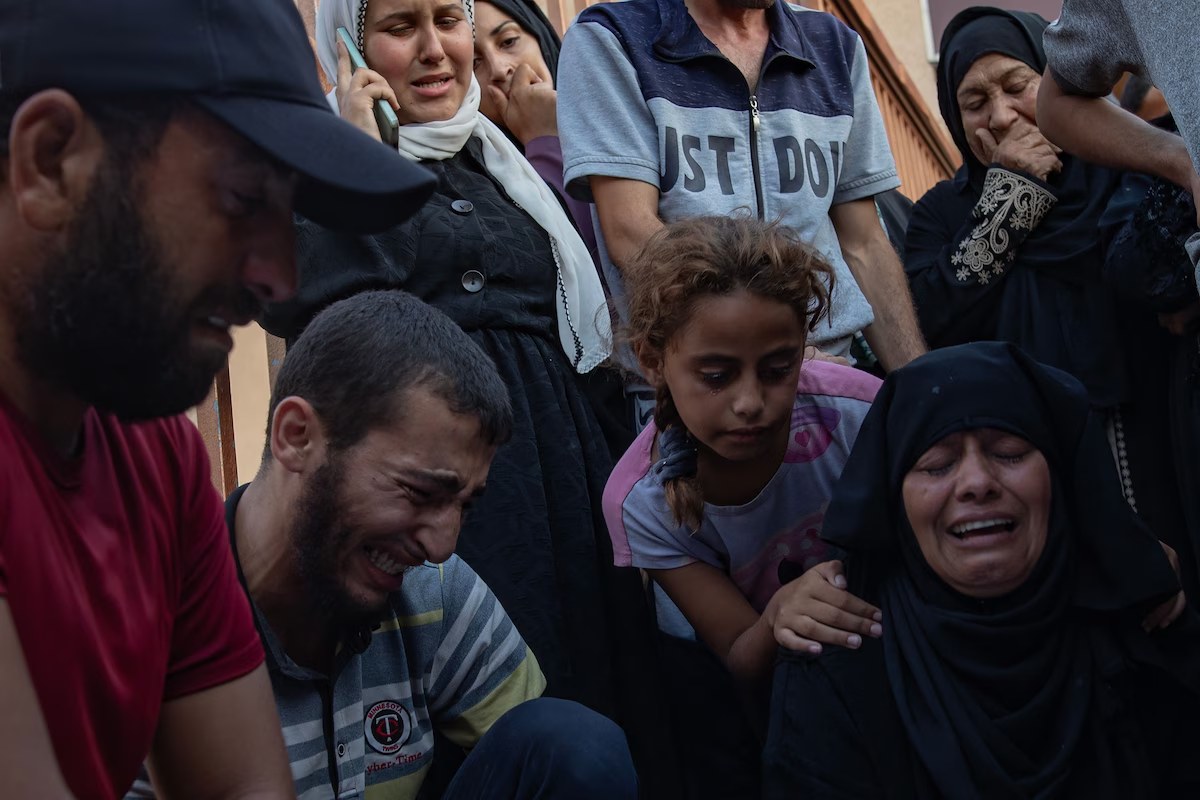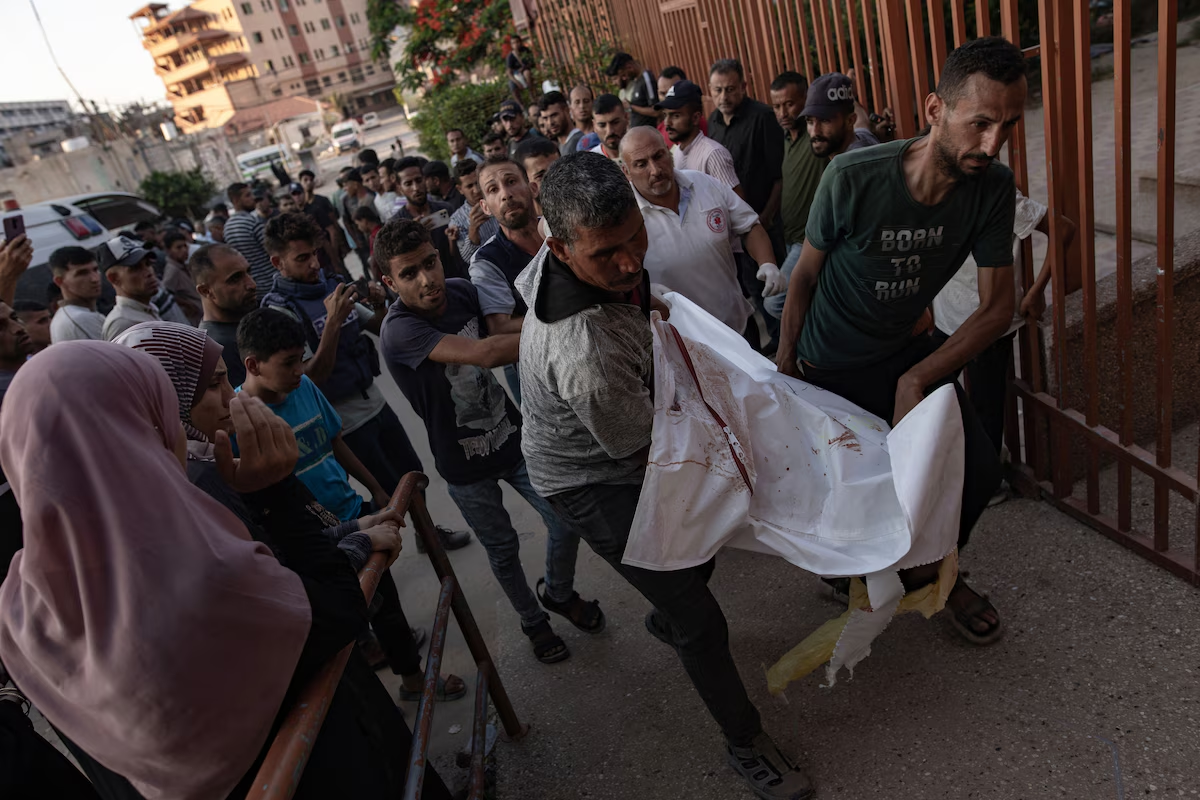Israeli strikes killed 38 people in four neighborhoods Saturday, the Gaza civil defense force said. The military said it struck Hamas infrastructure in the city.
By Victoria Bisset, Mohamad El Chamaa and Lior Soroka, The Washington Post,
June 22, 2024

Israeli airstrikes on four neighborhoods in Gaza City killed at least 38 people Saturday, the Gaza civil defense force said, adding that rescue crews were continuing to search for more dead and wounded in the rubble.
The bombardment hit residential buildings in the city’s north, south, east and west, with significant damage and a massive crater reported in the densely built Shati refugee camp in western Gaza City. In a statement, the Israel Defense Forces said its fighter jets “struck two Hamas military infrastructure sites in the area of Gaza City,” without elaborating. The Gaza civil defense force did not say if combatants were among the dead.
Video from Shati verified by Storyful showed entire blocks destroyed by the strike, with residents covered in dust from the debris while searching for survivors.
“People were sitting, and suddenly, missiles destroyed a group of houses and burned the entire area,” said Yousri al-Ghoul, 43, who lives in Shati.
“Most residents of the camp were affected because the shrapnel flew across the squares and residential blocks,” he said in a phone interview. “People were carrying others on their backs. There’s still people under the rubble.”
The multiple, heavy strikes were somewhat unusual for Gaza City, where some of the major battles between Israel and Hamas have died down. Still, the IDF carries out regular strikes in the city, including one on Friday that killed five municipal workers, according to local authorities.
On Friday, at least 22 people were killed and 45 injured after “heavy-calibre projectiles” landed near an office of the International Committee of the Red Cross in the Mawasi area of Rafah.
The strike “damaged the structure of the ICRC office, which is surrounded by hundreds of displaced civilians living in tents, including many of our Palestinian colleagues,” the humanitarian group wrote in a statement Friday.
“Firing so dangerously close to humanitarian structures puts the lives of civilians and Red Cross staff at risk,” the organization said, adding that the “incident caused a mass casualty influx at the nearby Red Cross Field Hospital.”
The Israeli military said that it was “examining the incident,” but that an initial inquiry found “there was no direct attack carried out by the IDF against a Red Cross facility.”
The European Union’s foreign policy chief, Josep Borrell, called for an independent investigation into the shelling in a statement on X, formerly Twitter.
“An independent investigation is needed and those responsible must be held accountable,” he wrote. “Protection of civilians is an obligation under [the] Geneva Conventions.”

On Saturday night in Tel Aviv, massive crowds of demonstrators turned out to condemn the government of Prime Minister Benjamin Netanyahu, called for early elections and demand Israel reach a cease-fire deal with Hamas to free the remaining hostages held in Gaza.
At the rally, prominent Israeli author David Grossman issued a call for Israelis to fill the streets and fight for the country. “Now’s the time to fight, men, women. Now’s the time to fill the roads and streets,” he said, reading from a poem he wrote. The crowd erupted in applause, Israeli media reported.
“There’s someone to fight for, it all depends on you. Now’s the time to rise, to live,” he said. “All hangs by a thread.”
Here’s what to know
Yemen’s Houthi fighters are threatening some of the world’s most vital shipping routes despite months of U.S.-led airstrikes, as The Post reports. The once ragtag rebels are drawing from an arsenal of increasingly advanced weapons to attack vessels in and around the Red Sea, sinking one ship and setting another ablaze just this month.
Around 39,000 Palestinian students are unable to take their final high school exams, which were to begin on Saturday, because of the war in Gaza, Palestinian state news agency WAFA reported. According to humanitarian groups, about 625,000 students have been out of school since the war began in October.
An Israeli citizen was shot dead in the town of Qalqilya on Saturday, according to the Israel Defense Forces. The IDF said it was operating in the town in the occupied West Bank after the killing. Israeli media reported that it was the second killing of an Israeli in the town in recent days.
Cuba announced that it intends to join South Africa’s case accusing Israel of genocide at the International Court of Justice, according to a statement from its Foreign Ministry released Friday. Earlier this month, Spain became the first European country to ask to join the case; other countries including Mexico, Colombia, Nicaragua and Libya have requested to join, according to the Associated Press.
A senior State Department official and skeptic of the Biden administration’s “bear hug” approach to the government of Israel resigned this week, in a setback for U.S. diplomats pushing for a sharper break with Prime Minister Benjamin Netanyahu and his far-right coalition, said three people familiar with the matter.
At least 37,551 people have been killed and 85,911 injured in Gaza since the war started, according to the Gaza Health Ministry. It does not distinguish between civilians and combatants but says the majority of the dead are women and children. Israel estimates that about 1,200 people were killed in Hamas’s Oct. 7 attack, including more than 300 soldiers, and it says 312 soldiers have been killed since the start of its military operations in Gaza.
Bisset reported from London, El-Chamaa from Beirut and Soroka from Tel Aviv.
Israel-Gaza war
The Israel-Gaza war has gone on for months, and tensions have spilled into the surrounding Middle East region.
The war: On Oct. 7, Hamas militants launched an unprecedented cross-border attackon Israel that included the taking of civilian hostages at a music festival. (See photos and videos of how the deadly assault unfolded). Israel declared war on Hamas in response, launching a ground invasion that fueled the biggest displacement in the region since Israel’s creation in 1948.
Gaza crisis: In the Gaza Strip, Israel has waged one of this century’s most destructive wars, killing tens of thousands and plunging at least half of the population into “famine-like conditions.” For months, Israel has resisted pressure from Western allies to allow more humanitarian aid into the enclave.
U.S. involvement: Despite tensions between Israeli Prime Minister Benjamin Netanyahu and some U.S. politicians, including President Biden, the United States supports Israel with weapons, funds aid packages, and has vetoed or abstained from the United Nations’ cease-fire resolutions.
History: The roots of the Israeli-Palestinian conflict and mistrust are deep and complex, predating the establishment of the state of Israel in 1948. Read more on the history of the Gaza Strip.
- Mapping Israel’s expanding battle for Rafah, a test of U.S. red lines May 31, 2024
- Gaza conditions worse than ever, USAID chief says, as Rafah invasion rages May 30, 2024
- Experts say Israel used U.S.-made bomb in deadly Rafah strike May 29, 2024

Victoria Bisset is a breaking-news reporter for The Washington Post’s London Hub, covering the most urgent and consequential stories as they unfold on the European day.

Mohamad El Chamaa is a Beirut-based researcher and reporter for The Washington Post, covering Lebanon, Syria, Turkey, and the Gulf. An urban planner by training, he previously worked on housing in post-disaster events and was a features reporter for L’Orient Today.
Leave a Reply
You must be logged in to post a comment.